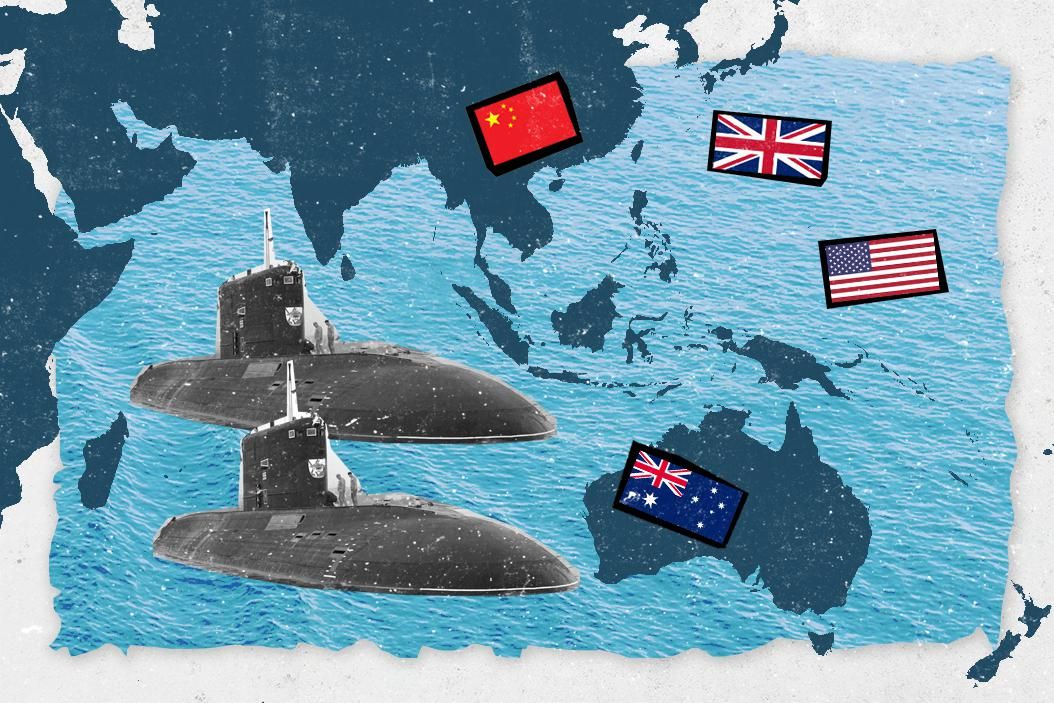Imagine you're China. How would you feel if the some of the world's richest and most powerful countries, the US and its allies, were constantly joining forces against you, yet officially pretending not to?
First they set up a mega-regional trade deal that left you out unless you gave up your own — highly successful — state-led capitalism model to get rich. (America then backed out because of hello, Donald Trump, but still.) Then they dusted off an old talk shop that now looks suspiciously like an attempt to create an Asian NATO around you. Then, to try to pry away some of your new friends, they vowed to build bridges, ports and roads in many of the same developing countries where you've been doing the same thing for years.
Now, the US and its Anglophone besties, the UK and Australia, have unveiled AUKUS, an ambitious new security partnership for the Indo-Pacific region. As part of the pact, Australia is getting fancy new nuclear-powered submarines that your equipment can't easily detect.
The AUKUS partners say this new club it has nothing to do with you — but everyone knows it's all aboutyou.
On the one hand, you have reasons to be upset.
You used to be poor, but worked extremely hard to get to where you are today. You'd be happy just being the big boss in Asia, whatever the Indians say. You don't want to meddle in the other countries' business, nor for any other country to meddle in yours — unlike America and its buddies in Afghanistan or, for that matter, Iraq.
The AUKUS gang say you're oppressing Uyghurs and democracy-loving Hong Kongers, as well as threatening Taiwan, but you think it's none of their business. Shouldn't they get their own houses in order before criticizing yours? And who are they to complain about your famous Nine-Dash Line when it comes to who owns what in the South China Sea?
On the other hand, maybe those who don't like you have a point.
Perhaps they are right when they say you only played by their trade rules until you figured out how to cheat. Perhaps you also went too far with the Aussies for wanting to know where a certain virus came from. Perhaps you fear some of your new friends now won't have your back because they owe you money but don't trust you.
Still, with AUKUS now you have big problems. First, it'll be much harder for you to mess around in the South China Sea with the Aussie subs lurking. Second, since those subs run on the same stuff as nukes, you're worried about Japan or South Korea asking for the tech and then using the fuel to build their own atomic arsenals, sparking a regional arms race. Third, you'd rather avoid having to splurge on military tech just to keep up.
Which all raises the question — what'll you do about it?
Part of you wants to stay calm, look at the bigger picture, and tell yourself that later on your enemies may change their minds when they change governments, or that their squabbles over how to deal with you will leave you room to just do your thing. You might even persuade some of their friends to be your friends too, especially in Europe, where many countries still want to sign a trade deal with you — and the French are seething over le grand sub snub.
But another part of you, which some call the "wolf warrior" side, is fed up with playing nice and then getting the short end of the stick. After all, you know that sooner or later you'll dominate Asia because America and its buddies aren't willing to put up an actual fight to stop you. And you've waited far too long to get your hands on that insubordinate self-governing island.
Now that the West laying its cards on the table so openly, do you feel like making another bold move of your own?More For You
Most Popular
In this "ask ian," Ian Bremmer analyzes Trump’s recent meeting with Zelensky and how close (or far) Russia and Ukraine are from a peace deal.
Syrian President Ahmed al-Sharaa attends the military parade of the Syrian army in Umayyad Square in central Damascus to mark the one-year anniversary of the fall of the Assad regime, on Dec. 8, 2025.
A year ago this month, Syria’s brutal dictatorship collapsed. There are signs of recovery, but sectarian violence threatens to undermine the optimism.
